I recently had the good fortune to visit our Capital and spend a day touring the National Mall. It was an excellent trip, particularly the Smithsonian Natural History Museum. I would highly recommend anyone who has the means make the trip at some point. But as I toured the National Mall and surrounding areas, something struck me, something that I had been ambiently aware of before, but never so directly confronted with.
Patriotism is a religion.
Now I have a deep interest in and respect for US history, and I understand the sort of reverence before history that can be felt at certain sites or at memorials for great historical figures, but when touring DC I was struck by just how eerily religious a lot of the imagery was.
The first memorial to really catch my eye in this way was the monument to General George Meade, the Union General of the Civil War, which is just a short walk from the Capitol Building. As I looked upon the monument, it struck me: “That is a saint.” With his regal posture and golden halo, he is portrayed almost identically to the way Saints are typically portrayed in Catholic iconography.
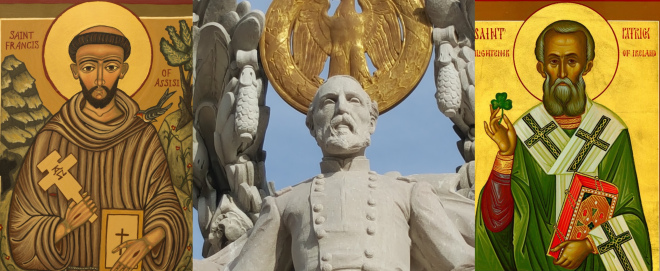
Left to Right: Saint Francis of Assisi, General George Meade, Saint Patrick of Ireland
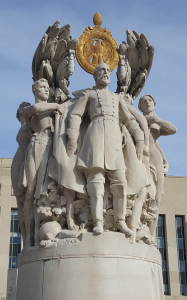
Gen. Meade
And while not particularly associated with Saints, the large structures over either shoulder holding the halo aloft are quite reminiscent of wings are they not? These similarities seemed to striking to be coincidence.
Later in the day I made my way to the Lincoln Memorial. Of course I have seen numerous picture of the memorial before, but I immediately recognized what I was seeing, something I had never realized until I stood at the foot of the memorial in person. “That is Zeus at Olympia.”
The Statue of Zeus at Olympia no longer exists, but we have several descriptions of it from contemporaries and a few renderings from coinage at the time, enough for artists to have created reasonably accurate images of what was once a wonder of the Greek world. The likeness to the Lincoln Memorial is pronounced. The way he is entroned, the massive size, event the fact that both Lincoln and Zeus sat in column lined rooms in Greek style temples atop a hill.
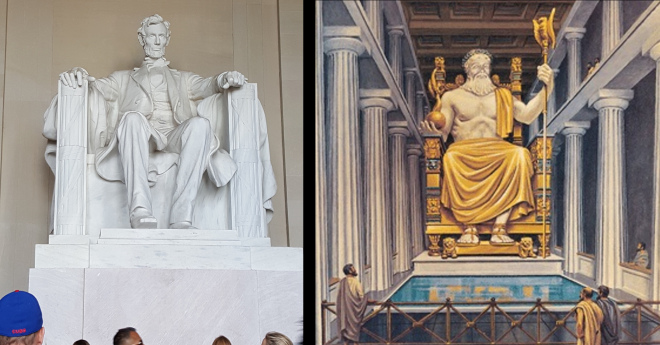
Left to Right: Lincoln Memorial, Zeus at Olympia
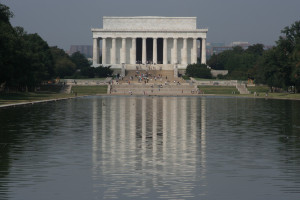
Lincoln Memorial Reflecting Pool
Perhaps most convincing at all, the statue of Zeus had a reflecting pool at it’s feet, and while the Lincoln Memorial does not have a reflecting pool inside at Lincoln’s feet, before the entrance to the Memorial, at the foot of the steps, is an enormous reflecting pool. That cannot be coincidence.
So as I sat on the grass at the National Mall, contemplating all of this, and wondering if this was all mere coincidence, my attention was drawn to the pleasant shade I was sitting 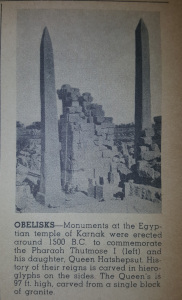 in. The shade of course cast by the largest and most iconic of all of the monuments at the National Mall: The Washington Monument, at the feet of which I sat. Of course, the largest and grandest of all monuments at the Capital is the world’s largest Obelisk.
in. The shade of course cast by the largest and most iconic of all of the monuments at the National Mall: The Washington Monument, at the feet of which I sat. Of course, the largest and grandest of all monuments at the Capital is the world’s largest Obelisk.
The Obelisk is one of the most ancient and prevalent religious symbols in the world. Most associated in antiquity with Egypt, these structures were almost always of a religious nature. In Rome they also serve as religious monuments, with the most famous of all being the Lateran Obelisk marking the location of Emperor Constantine I’s baptism.
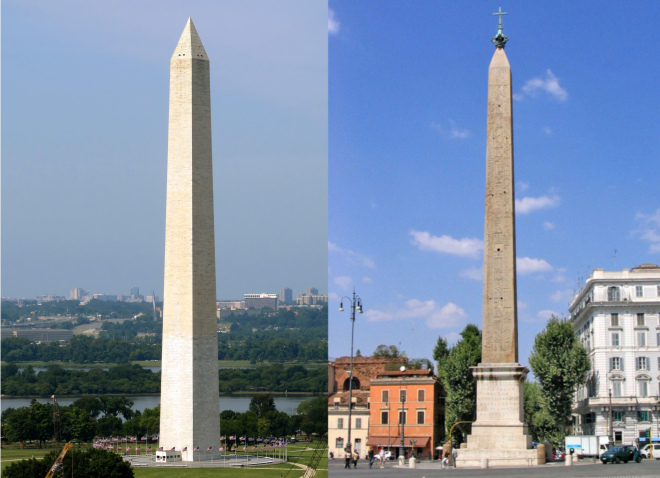
Left to Right: Washington Monument, Lateran Obelisk
I propose that it is no accident that many of our shrines and memorials to our Patriarchs have a pronounced religious flavor to them. Is Patriotism not the religion of the State? Does it not have its Holy Texts? Does it not have its symbols and icons that are to be treated with great reverence and care? Does patriotism not have its own hymns and parables and holy days and rites of observance? Much like religion, does not expressing a different form of patriotism as the rest of your community instantly mark you as an outsider and lower your social cachet?
I am not a religious person, nor am I a patriotic person. I have a great deal of respect and appreciation for the history of our nation and for the many fantastic qualities that make the USA influential, prosperous, and admirable. However, I have no inherent or innate deference to my national identity. I have no ideological predisposition to think of my own nation as best or our actions as righteous or our laws and founders as being somehow sacred and above reproach.
Shrines and memorials to influential and important figures of the past are all well and good. A humble place to take a moment to learn and reflect on the great works of those who came before is certainly important and worthwhile. Ostentatious quasi-religious monuments however, are gaudy. I can only speak for myself, but I must imagine that if I were a Founding Father, if I had fought a war against monarchs and helped establish a secular government, and somehow were able to leap forward in time to find Saintly effigies of myself, towering sculptures of me enthroned, or enormous Obelisks erected in my honor, that would make me profoundly uncomfortable and would think these people had somehow missed the point.
Advertisements Share this:




